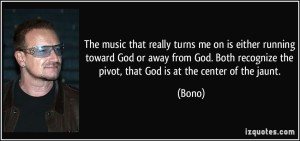When I first started obsessing over U2—and by that, I mean the point where I actually cared enough about them to know what they look like other than Bono’s sunglasses—I was convinced that I did not want to like Bono.
Well, that’s probably too strong of a statement. I wanted to like Bono. I wanted to like all of U2. But I didn’t want to “like” Bono. I didn’t want to be *that person,* the fangirl chick who screams for the lead singer rather than the other three bandmates who are equally important. So I purposefully stayed away from looking up Bono until I’d already researched everybody else in U2 and decided, firmly and officially beyond all doubt, that The Edge was going to be my favorite.
…Have you ever heard that saying about how the best way to make God laugh is to tell Him your plans?
…Yeah. About a quarter of the way through the Wikipedia article on Bono, I realized that Bono is definitely my favorite. I didn’t quite become *that person,* because I definitely adore The Edge and Larry and Adam (and I feel weird using their first names even though everyone does it), but I definitely got attached to Bono in a way that I probably couldn’t get attached to the others.
You see, when I got down to that shiny “Early Life” section of Wikipedia’s shrine to our favorite frontman, I found out that I am actually not the only person on the face of the planet (apart from my brother, who doesn’t count) who grew up with a Catholic father and a Protestant mother.
That’s right, folks. I come from a mixed-denomination family.
In the United States in the millennium, as everyone is so keen to call it, Catholic-Protestant families are much more common than they were in Ireland in the 1960s and ’70s. However, that combination is still a relatively obscure oddity; at least, it is where I’m from. My Baptist or Pentecostal classmates in elementary school used to ask me what my religion was, and after the fifth or sixth time I got weird looks after saying “half-Catholic and half-Methodist,” I learned pretty quickly to just say: “I’m a Christian.”
I remember going to both the Catholic church frequented by my father’s family and the Methodist church of my mother’s family as a child. I liked to sit on the kneelers in my father’s church and I loved to read from the red hymnals in my mother’s church. Even today, I have my paternal grandmother’s rosary hanging on my wall, even though I have no idea how to use it, and I keep a Methodist Book of Discipline on my bookshelf, which I can actually use quite well.
(And as a side note, I love to see pictures of Bono wearing rosary beads like a necklace, because even though that’s apparently a big no-no in the Catholic church, I did that long before I knew who Bono was.)
As I got older, I learned about all the denominations of Christianity, all the differences in doctrine and teachings, and in the end, I have always identified strongly with Methodist beliefs, so when I was in third grade, I joined my mother’s church (and later, my brother and father did, too).
However, if you see me on the street and ask me what religion I am, I will not say, “I am a Methodist.” I will not say, “I am half-Catholic and half-Methodist.” I will say, “I am a Christian.” My parents did not raise me and my brother to represent a denomination; they raised us to be Christian.
Bono exchanged shades with the Pope and wrote a poem for Billy Graham. Bono can write his own psalms and advocates numerous charities with seemingly inexhaustible energy. Bono is a Christian. I admire him for this.
Yet in a November 2005 interview with Rolling Stone, he said this: “As an artist, I see the poetry of it. It’s so brilliant. That this scale of creation, and the unfathomable universe, should describe itself in such vulnerability, as a child. That is mind-blowing to me. I guess that would make me a Christian. Although I don’t use the label, because it is so very hard to live up to. I feel like I’m the worst example of it, so I just kinda keep my mouth shut.”
While my first impulse is to shout, “You’re a Christian! Embrace the label!” I know that I must keep my mouth shut as well, because I understand what damage labels can do. It isn’t easy to be labelled and it definitely isn’t easy to deal with the way people react to the labels attached to someone. Sometimes, labeling yourself is like shoving yourself into a box, and you’re confined by walls, without any room for growth or error. According to @U2 (the fan site, not the Twitter account), Bono had something to say on this as well, during the ZooTV era: “It’s a trap when you agree to being one person because when you step out of character with that, you look like a hypocrite.”
Even though he was actually talking about his alter egos with that quote, he has a valid point. It’s so easy to get bogged down in the world of labels that people box themselves (and each other) into a corner and forget what we’re actually here to do: help people.
In Ireland, it is, or used to be, very easy to attach labels to different groups of people. If you’ve ever researched “Where The Streets Have No Name,” then you’ve probably heard that in Ireland and Northern Ireland, you can tell what religious denomination (among other things) that a person is based on where they live. I once read a book about Ireland and discovered a joke in which a man moves to Ireland and gets stopped by a man in his neighborhood. The man asks the newcomer whether he’s Catholic or Protestant, and the new guy replies that he’s Jewish. In response, the Irish guy says, “Well, are you a Catholic Jew or are you a Protestant Jew?”
Based on my research, religion in Ireland is (or at least, it was in the past) as much an issue of culture and family history as it was an issue of denomination. A person’s religious background was set, almost unchangeable, and tied to just about every other cultural factor. Religion wasn’t just religion; it was also location, economics, descent, and social status. When people over there said they were half-Catholic and half-Protestant, they weren’t saying it half-jokingly like I used to. They were completely—and sometimes deadly—serious. For some people, the label matters more than the spirit.
The last time I visited my paternal grandmother, she essentially told me that her issue with me and my brother is not that we are good United Methodists; it’s that we are bad Catholics. It’s as if she thinks that being “born into” one way of doing things automatically determines our path in life, regardless of our choices.
If it is this difficult to reconcile two different heritages for my family in America, the land of tolerance, in the 21st century, the “modern” world, I cannot contemplate how difficult it must have been for Bono and his parents in Ireland in the 1960s and ’70s. How difficult must it have been in decades past, when interdenominational marriages were even more of an oddity than they are now, and in a nation where The Troubles were taking place and religious heritage was given such great emphasis?
But Bono survived that. He struggled with the way he saw supposedly religious people acting around him, but he didn’t let that crush him. Bono did not shut himself off from Christianity because of his experiences; instead, he used his experiences to build himself up, and he brought many others up, too. Instead of giving up, he went on to do what matters most: doing what God called him to do.
And in that same 2005 Rolling Stone interview, he added this: “I feel as at home in a Catholic cathedral as in a revival tent.”
It isn’t the setting that counts; it’s the Spirit.
“One Lord, one faith, one baptism” (Ephesians 4:5).
Everyone has a lot to learn from Bono, but I think his testimony is especially meaningful to people who struggle with reconciling differences in heritage. It’s okay to come from a Catholic background, or a Protestant one, or any other kind of culture imaginable. It’s okay to be more than one thing and have more than one perspective. It’s okay to have experiences that you simultaneously embrace and struggle with. Those experiences have been given to us for a reason. It’s possible to survive—and to not be alone.
In the end, I guess the best way to sum up the point is with another quote from my favorite member of U2—and yes, this is yet another Bono quote from Rolling Stone:
“I am not a person who has to put God out of his mind to go out on the town. It’s a key point. The divided soul of Marvin Gaye, Elvis — these conflicts tore them apart. And they don’t tear me apart. I reckon God loves all of me.”
Lieutenant
Latest posts by Lieutenant (see all)
- We will run like a river to the sea - August 24, 2017
- Do You Feel Loved. Today? - June 18, 2017
- People like Bono, people like Finn Bálor - September 24, 2016




